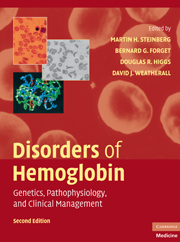Book contents
- Frontmatter
- Contents
- List of Contributors
- Foreword, by H. Franklin Bunn
- Preface
- Introduction, by David J. Weatherall
- SECTION ONE THE MOLECULAR, CELLULAR, AND GENETIC BASIS OF HEMOGLOBIN DISORDERS
- SECTION TWO PATHOPHYSIOLOGY OF HEMOGLOBIN AND ITS DISORDERS
- SECTION THREE α THALASSEMIA
- SECTION FOUR THE β THALASSEMIAS
- SECTION FIVE SICKLE CELL DISEASE
- SECTION SIX OTHER CLINICALLY IMPORTANT DISORDERS OF HEMOGLOBIN
- SECTION SEVEN SPECIAL TOPICS IN HEMOGLOBINOPATHIES
- SECTION EIGHT NEW APPROACHES TO THE TREATMENT OF HEMOGLOBINOPATHIES AND THALASSEMIA
- Index
- Plate section
SECTION FIVE - SICKLE CELL DISEASE
Published online by Cambridge University Press: 03 May 2010
- Frontmatter
- Contents
- List of Contributors
- Foreword, by H. Franklin Bunn
- Preface
- Introduction, by David J. Weatherall
- SECTION ONE THE MOLECULAR, CELLULAR, AND GENETIC BASIS OF HEMOGLOBIN DISORDERS
- SECTION TWO PATHOPHYSIOLOGY OF HEMOGLOBIN AND ITS DISORDERS
- SECTION THREE α THALASSEMIA
- SECTION FOUR THE β THALASSEMIAS
- SECTION FIVE SICKLE CELL DISEASE
- SECTION SIX OTHER CLINICALLY IMPORTANT DISORDERS OF HEMOGLOBIN
- SECTION SEVEN SPECIAL TOPICS IN HEMOGLOBINOPATHIES
- SECTION EIGHT NEW APPROACHES TO THE TREATMENT OF HEMOGLOBINOPATHIES AND THALASSEMIA
- Index
- Plate section
Summary
PATHOPHYSIOLOGY
A β-hemoglobin gene mutation results in the synthesis of the sickle β-globin chain. Sickle hemoglobin (HbS) polymerizes when deoxygenated, and polymer-associated injury to the sickle erythrocyte is the proximate cause of sickle cell disease. The principal pathophysiological features of this disease are shown in the figure and can be grouped as vasoocclusive/blood viscosity related and hemolysis/vasculopathy related. This complex pathophysiology involves diverse molecular and cellular defects that include abnormal erythrocyte volume regulation, impaired nitric oxide bioavailability, reperfusion injury and inflammation, altered hemostasis, defects of intercellular interactions, endothelial cell damage, leukocyte and platelet activation, and in all probability, other perturbations of normal physiology.
DIAGNOSIS
Sickle cell disease is a constellation of similar but not identical disorders, all of which have at least 50% HbS in the blood. The phenotype of sickle cell disease is caused by several common and some less common genotypes; homozygotes for the HbS gene are said to have sickle cell anemia; common compound heterozygous forms of disease include HbSC disease and HbS-β thalassemia. The cornerstone of the clinical laboratory diagnosis is the detection and quantification of HbS. Depending on the context of the diagnostic situation, direct detection of the HbS and other globin gene mutations can be warranted. Sickle cell trait is clinically benign and not considered a form of sickle cell disease.
CLINICAL FEATURES
The complications of sickle cell disease can occur acutely, producing dramatic clinical findings, or they can be chronic, disabling, and cause premature death.
- Type
- Chapter
- Information
- Disorders of HemoglobinGenetics, Pathophysiology, and Clinical Management, pp. 435 - 436Publisher: Cambridge University PressPrint publication year: 2009



